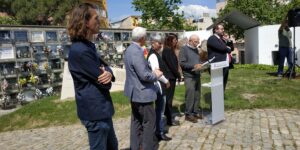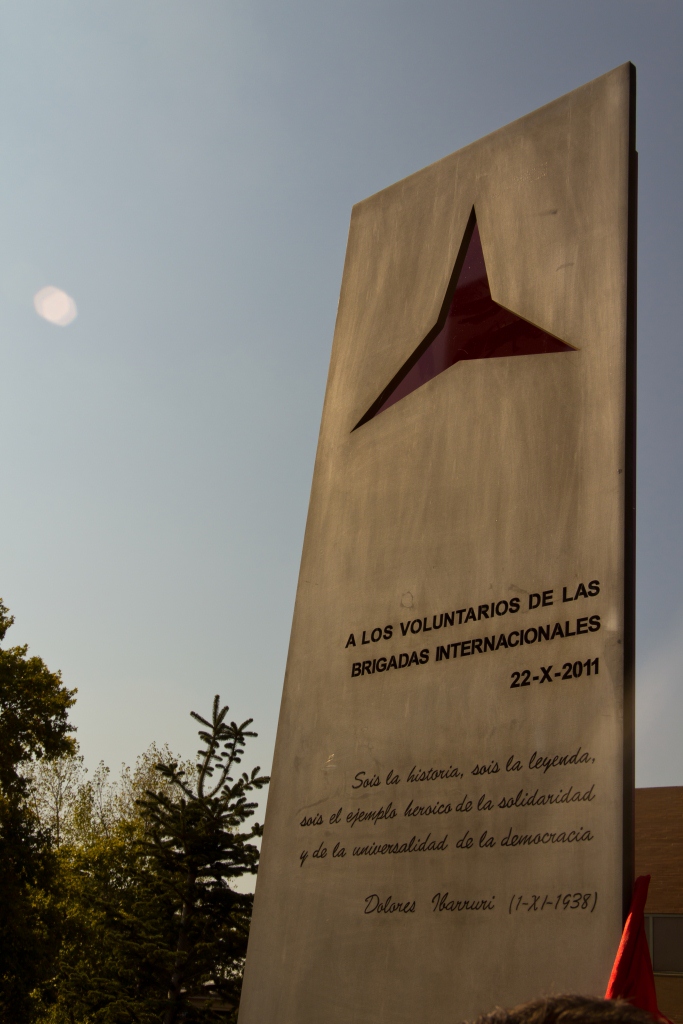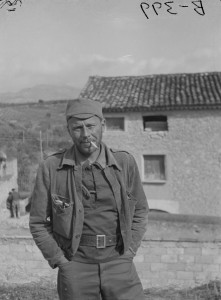Solidarity Forever: Spain and the International Brigades Today
Solidarity requires a combination of teaching, learning and encouragement. I’ve never seen anything like the camaraderie surrounding the historical memory of the International Brigades in Spain. I’ve studied one of these guys for about a decade, a Lincoln volunteer who died in 1985. His story is astounding. It amazed me that nobody had ever written a book about him. His dedication to his beliefs in social justice (read anti-fascism) and his personal story are extraordinary. Studying him has brought me to the conclusion he had no choice in the matter. Once you develop a social conscience it is not generally something you turn your back on. In the late thirties this meant the cause of Spain was in the front of your mind. He was open to the hand he was dealt and acted on it. That solidified his social conscience in a way that is hard for us to understand today, on the battlefields of Spain. This spirit became contagious, and he passed on his sense of morality to all of us who have been exposed to his work. He is a hero, possibly of circumstance, and makes you think that maybe you could be too. His is a form of solidarity he has passed onto his family too. Dan Bessie, his oldest son, recently passed away. Last time I got a chance to spend time with him was at the inauguration of the Alvah Bessie Program, named for his “pop,” through which the Catalan government seeks to find the remains of International Brigade volunteers whose remains are still buried in Cataluña.
A year later, I am four presentations in to an eight-stop promotion of some notebooks Alvah Bessie never intended to publish. Dan Bessie published them about twenty years ago in English and gave us permission to translate them into Spanish for publication along with an introduction, an interview with Dan and some other additions. The book’s publication through the University of Cádiz, here in the southwest corner of Spain, in a collection is called Letra pequeña, is itself an act of solidarity. This is the sixth book in the collection. The seventh is forthcoming in the fall by Dr. Tyler Barbour and examines anti-Franco lyrics in Flamenco music during the dictatorship.
Nieves Vázquez is the director of Letra pequeña. She had just finished her novel Experimentos sobre el vacío (Experiments Over the Void) when she introduced me to Alvah Bessie. She’d been reading letters from International Brigade volunteers doing research for the novel when she came across Bessie. The protagonist of the novel goes in search of her father she has never known, an International Brigade (IB) veteran. All my research on Bessie stemmed from there. People were receptive of my first book on his Spanish corpus, and I made some friends who are also interested in the historical memory of the IB. Many of them pushed me to translate Alvah Bessie’s notebooks from the Spanish Civil War. They were nice enough to arrange presentations in Madrid at la Central bookstore at the Reina Sofía, Seville at a great little anarchist bookshop called Quilombo, and at the Cádiz Book Fair.
Dan’s publication of his pop’s notebooks was through a university, as he wanted them to circulate in universities as widely as possible. That makes sense. They are historical documents and should maintain some sort of connection with academia. The Spanish edition is bilingual, with the original text included in English in the appendix. They were the notes Alvah used to write the first book published by any of the Lincolns on the Spanish War, Men in Battle (1939). Dan was a mentor to me for many years. His pop was his hero too. In many ways and he followed in his footsteps as a writer and filmmaker, not to mention politically. He is glad there are people out here working to keep Alvah’s legacy from disappearing. This threat is real. Bessie, after all, was one of the lesser known “members” of the Hollywood Ten.
Alvah worked against the intentional forgetting of the Spanish Civil War and Franco’s dictatorship. It was, and still is, an inconvenient episode in history for a country proclaiming victory over fascism in WWII, to have thrown the Second Spanish Republic to the wolves. The US government supported Franco’s forty-year fascist dictatorship by building military bases around Spain. Bessie’s fight against this forgetting (olvido) can be seen in his books and articles he published until his death. One of the more interesting historical memory projects Bessie participated in was the 1968 Jamie Camino film España otra vez. He acted in the movie and wrote some of the dialogue in Franco’s Spain when he was no longer allowed to do so in Hollywood. His 1975 book on the experience, Spain Again, explains his internal conflicts working in fascist Spain while looking for the grave of his friend Aaron Lopoff. The film is one of the first in Spain related to “historical memory” and was screened at the Cannes film festival well before the term was even being used. It is worth seeing and is even better after having read Bessie’s related memoir.
Bessie’s work lives on as a fight in solidarity with the Spanish people for their historical memory. It projects a sort of class conscience that goes beyond economics and forms part of our ethics as a community of teachers and learners. One of the things that is attractive to many of us who study the Lincolns is how ordinary men in women were able to do such extraordinary things for others they did not personally know. They participated in superhuman acts of solidarity and thousands gave their lives doing so. Many of us feel a bit star-struck when we study these men and women. The things they did were true acts of love for humanity that drove people to march over mountains in the dead of night, sneaking into a country which was prohibited to enter, it made them go days without sleep, as well as kill and be killed.

At the official announcement of the Alvah Bessie Program, Mataró Cemetery, April 29, 2022, with Dan Bessie speaking.
I am looking forward to going to the places Alvah Bessie writes about in these four journals to present them at the end of July. The historical society Porta de Historia has set up presentations in the places Bessie is writing about in 1938. Allen Warren and Alicia García Lopez are working on a documentary about Bessie’s Men in Battle. The book is currently out of print here in Spain, but you can still find some second-hand paper copies floating around. It is a popular book and people really seem to like it. The presentations Porta de Historia has set up for the Bessie notebooks will be my first trip to these locations Bessie talks about in his notes and corresponding book. You see them in pictures and films but being there to meet people who are also interested in the topic will be special. Lees-McRae College in North Carolina has funded the trip and Shannon O’Neill at NYU (curator of the archives where Bessie’s notebooks are located) was nice enough to take some photos of them for me so that I can bring them back, in a way, to where they were written and share them with others who are interested in seeing their current condition.
We’ll take a trip to the place where Alvah’s comrade is buried for the documentary. Bessie published a short story about him called “My Brother, My Son” in 1940 and last year The Volunteer published an article about the discovery of his burial place, a plaque will be placed there in his honor. Lopoff (or Lopow as he was called before the war) studied Liberal Arts at Texas A&M University in 1930. It is a school that has a military history and celebrates Lt. Col. Earl Rudder’s leading the troops at Normandy on June 6th, 1944, to fight the same fascist forces Lopoff, Bessie and thousands of other Lincolns fought in Spain five years before. (Sixty-five years after Lopow studied Liberal Arts at Texas A&M, I did too.) He was in the Corps of Cadets, as everyone was back then, in the Company C Infantry unit. Looking at their group photo in the yearbook I wonder which one he is. They all look the same in uniform with their crew-cuts. Krista Oldham is the university archivist at A&M who found all this information for me—just one more example of this worldwide solidarity around the IB volunteers. So are Friends of the International Brigades (AABI) in Madrid. If you are ever in Madrid, look up their president, Severiano Montero. He is always happy to share his vast wealth of knowledge about the Spanish Civil War and promote the scholarship of others as it relates to the IB. You could also reach out to José A. Zarza at Gefrema, another Madrid-based historical society supporting the historical memory of the Spanish War.














